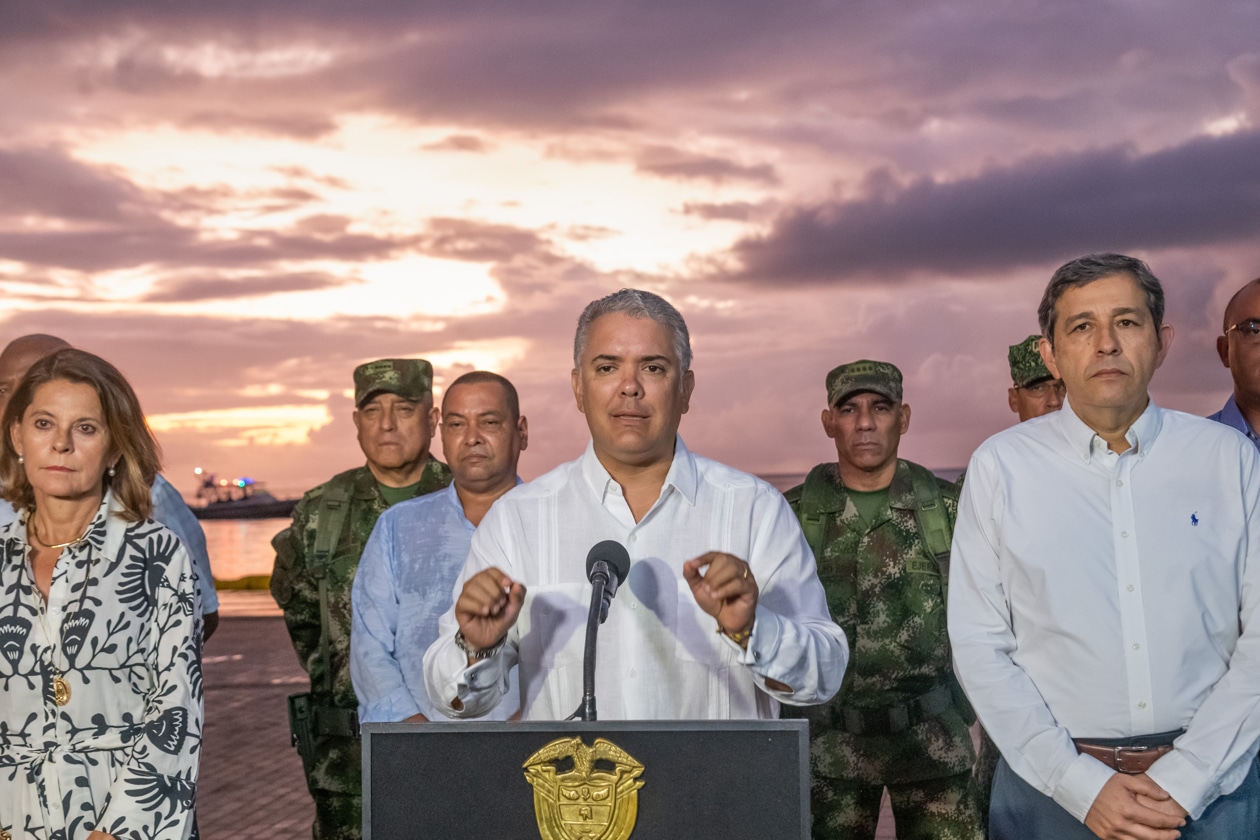The president of Colombia, Iván Duque, assured this Thursday that his government will not allow Nicaragua to limit the rights of his country in the Caribbean Sea, nor those of the Raizal community of the archipelago of San Andrés and Providencia.
Duque reacted like this after hearing the new ruling of the International Court of Justice (ICJ) that this Thursday considered that Colombia has violated Nicaragua’s “sovereignty and jurisdiction” in its own Exclusive Economic Zone (EEZ) by authorizing fishing activities in Nicaraguan waters, and ordered him to “immediately cease” his conduct.
“My government, until next August 7, will continue with the superior task of preventing Nicaragua from limiting or trying to limit the rights of Colombia,” Duque said in a statement to the country from the island of San Andrés, accompanied by the vice president and foreign minister. , Marta Lucía Ramírez, the military and police leadership and other authorities.
The president also pointed out that, “in accordance with international law”, he will seek “the protection of the marine environment and the continuity of the interdiction of illicit drug trafficking and the fight against transnational crimes in the area”, which is another of your country’s arguments for Navy ships to sail in those waters.
“Our obligation is to defend Colombia’s sovereignty over the historic and indivisible archipelago of San Andrés, Providencia and Santa Catalina and to defend its population in an unrestricted and permanent manner, as well as to defend Colombia’s interests in the Caribbean Sea; Faced with this responsibility, there can be no hesitation or ambiguity”, emphasized the president.
Raizal community
Duque stressed: “We will not allow any right of the Raizal community to be limited” in the archipelago and announced that in the coming days the regulations that reinforce these principles will be issued.
The ruling of the ICJ, based in The Hague, is about a complaint by Nicaragua for alleged violations of sovereign rights and maritime spaces in the Caribbean Sea, initiated by the Central American country in 2013.
The Court considered valid Managua’s claims regarding Colombia’s violation of Nicaragua’s “sovereign rights and jurisdiction” in its own EEZ by authorizing fishing activities by Colombian vessels in Nicaraguan waters and for its “interference with activities marine and fisheries scientific research” of that country.
Before the ruling, the president called for the unity of Colombians around the cause of defending national sovereignty over the Caribbean archipelago and said that “the defense of national integrity and our limits cannot obey political flags or ideological”.
“Disgraceful dictatorship”
In another ICJ ruling, dated November 19, 2012, Colombia maintained sovereignty over the archipelago of San Andrés, Providencia and Santa Catalina, as well as the keys that comprise it, and conserved 12 nautical miles of water surrounding these territories. , but lost almost 75,000 square kilometers of sea to Nicaragua.
However, Duque reiterated that by constitutional mandate, the limits of Colombia “can only be modified through a treaty approved by the Congress of the Republic.”
In this regard, he recalled that since November 2012, “Colombia has been willing to resolve its differences through peaceful and diplomatic means, but Nicaragua has not allowed any progress in that direction” and in 2014 “closed the door” to a settlement.
“The Nicaraguan government today constitutes a disgraceful dictatorship. In a dictatorship there is no respect for the rule of law or for the democratic pillars. The litigious spirit of that country is a recurring practice that has also been revealed with other states in the region, ”he said.
Despite the fact that today’s ruling constitutes a setback for the country, the president stressed that “the Court did not accept Nicaragua’s claim that Colombia be sentenced to pay compensation and rejected the claim that the case remain open until Colombia comply with the 2012 ruling.”
“The Navy will be able to continue to be present and exercise the right to free navigation and overflight in the area, this is something fundamental,” said Duque, adding: “In no case is the presence of the Navy a threat of the use of force as Nicaragua claimed it.”
He also stressed that the Integral Contiguous Zone that Colombia established from the mainland to the archipelago, located 720 kilometers northwest of the coast, “gives Colombia the right to preserve its cultural and archaeological heritage,” despite the fact that the ICJ considered that by omitting the delimitation established in 2012, said area “does not conform to customary international law”.

















